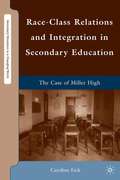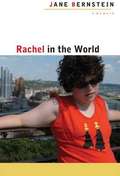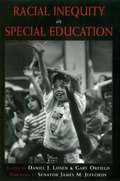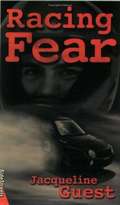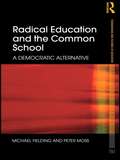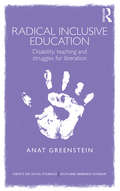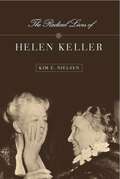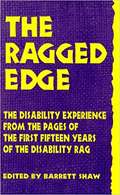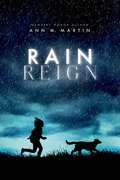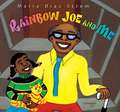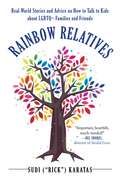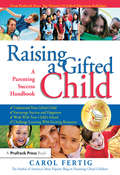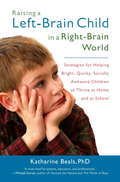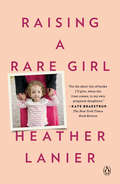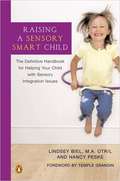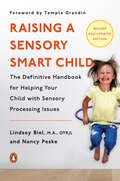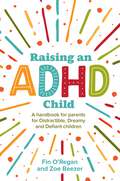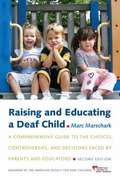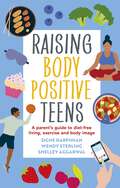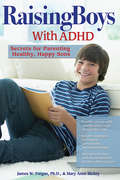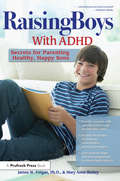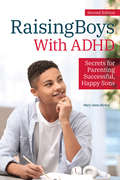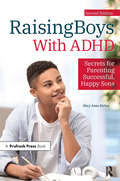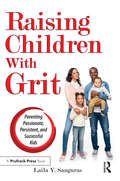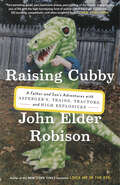- Table View
- List View
Race-Class Relations and Integration in Secondary Education
by Caroline EickEick explores the history of a comprehensive high school from the world views of its assorted student body, confronting issues of race, ethnicity, class, gender, nationality, and religion. Her case study examines the continuities and differences in student relationships over five decades.
Rachel in the World: A Memoir
by Jane BernsteinWhat happens when love is no longer enough? Jane Bernstein thought that learning to accept her daughter's disabilities meant her struggles were over. But as Rachel grew up and needed more than a parent's devotion, both mother and daughter were confronted with formidable obstacles. Rachel in the World, which begins in Rachel's fifth year and ends when she turns twenty-two, tells of their barriers and successes with the same honesty and humor that made Loving Rachel, Bernstein's first memoir, a classic in its field. The linked accounts in part 1 center on family issues, social services, experiences with caregivers, and Rachel herself--difficult, charming, hard to fathom, eager for her own independence. The second part of the book chronicles Bernstein's attempt to find Rachel housing at a time when over 200,000 Americans with mental retardation were on waiting lists for residential services. As Rachel prepares to leave her mother's constant protection, Bernstein invites the reader to share the frustrations and unexpected pleasures of finding a place for her daughter, first in her family, and then in the world.
Racial Inequity in Special Education
by Daniel J. Losen Gary OrfieldAn illuminating account of a widespread problem that has received little attention, Racial Inequity in Education sets the stage for a more fruitful discussion about special education and racial justice.
Racing Fear (SideStreets #1)
by Jacqueline Guest"Racing Fear" is an action-packed ride that takes a hard look at the selling of prescription drugs.
Radical Education and the Common School: A Democratic Alternative (Foundations and Futures of Education)
by Michael Fielding Peter MossWhat is education, what is it for and what are its fundamental values? How do we understand knowledge and learning? What is our image of the child and the school? How does the ever more pressing need to develop a more just, creative and sustainable democratic society affect our responses to these questions? Addressing these fundamental issues, Fielding and Moss contest the current mainstream dominated by markets and competition, instrumentality and standardisation, managerialism and technical practice. They argue instead for a radical education with democracy as a fundamental value, care as a central ethic, a person-centred education that is education in the broadest sense, and an image of a child rich in potential. Radical education, they say, should be practiced in the ‘common school’, a school for all children in its local catchment area, age-integrated, human scale, focused on depth of learning and based on team working. A school understood as a public space for all citizens, a collective workshop of many purposes and possibilities, and a person-centred learning community, working closely with other schools and with local authorities. The book concludes by examining how we might bring such transformation about. Written by two of the leading experts in the fields of early childhood and secondary education, the book covers a wide vista of education for children and young people. Vivid examples from different stages of education are used to explore the full meaning of radical democratic education and the common school and how they can work in practice. It connects rich thinking and experiences from the past and present to offer direction and hope for the future. It will be of interest and inspiration to all who care about education - teachers and students, academics and policy makers, parents and politicians.
Radical Inclusive Education: Disability, teaching and struggles for liberation (Concepts for Critical Psychology)
by Anat GreensteinMany people who work in education start out with enthusiastic ideals about education as a positive force that can spur change in the life of the learner and in society at large, yet find themselves frustrated with a bureaucratic system that often alienates and excludes many of its students. This is particularly true for students identified as having "special educational needs" (SEN) or disability, a label often used to justify the ways in which students are failed by a system that focuses on narrow definitions of knowledge, seeks to normalise and control behaviour, and values economic productivity over other forms of human activity. Radical Inclusive Education explores how current educational practices, such as standardised tests and league tables, exclude and fail many disabled students, and naturalise educational inequalities around gender, class, ethnicity and ability. Informed by the social model of disability, the book argues that educational theories and practices that are geared towards social justice and inclusion need to recognise and value the diversity of human embodiments, needs and capacities, and foster pedagogical practices that support relations of interdependency. The book draws on work in disability studies, critical psychology and critical pedagogy, and also real life examples from interviews with activists in the disabled people’s movement, and from research in a school, to offer examples of what radical inclusive education – that is sensitive to the needs of all students – might look like in practice. As such, it will be of great interest to practitioners and students in the field of education, particularly for those interested in SEN and disability, sociology of education, critical pedagogy, informal education and social movement learning.
The Radical Lives of Helen Keller (The History of Disability #1)
by Kim E. NielsenA political biography that reveals new sides to Helen KellerSeveral decades after her death in 1968, Helen Keller remains one of the most widely recognized women of the twentieth century. But the fascinating story of her vivid political life—particularly her interest in radicalism and anti-capitalist activism—has been largely overwhelmed by the sentimentalized story of her as a young deaf-blind girl. Keller had many lives indeed. Best known for her advocacy on behalf of the blind, she was also a member of the socialist party, an advocate of women's suffrage, a defender of the radical International Workers of the World, and a supporter of birth control—and she served as one of the nation's most effective but unofficial international ambassadors. In spite of all her political work, though, Keller rarely explored the political dimensions of disability, adopting beliefs that were often seen as conservative, patronizing, and occasionally repugnant. Under the wing of Alexander Graham Bell, a controversial figure in the deaf community who promoted lip-reading over sign language, Keller became a proponent of oralism, thereby alienating herself from others in the deaf community who believed that a rich deaf culture was possible through sign language. But only by distancing herself from the deaf community was she able to maintain a public image as a one-of-a-kind miracle.Using analytic tools and new sources, Kim E. Nielsen's political biography of Helen Keller has many lives, teasing out the motivations for and implications of her political and personal revolutions to reveal a more complex and intriguing woman than the Helen Keller we thought we knew.
The Ragged Edge: The Disability Experience from the Pages of the First Fifteen Years of The Disability Rag
by Barrett ShawWhen it began publication in the late 1970s The Disability Rag was at the cutting edge of the disability movement. This book gathers essays and poetry from the Rag's first fifteen years. The voices are angry and honest, speaking of rights violated and dreams deferred, and always holding out the hope of a better future. These essays are written with the philosophy that each of us, no matter how severely disabled, deserves to be treated with respect and to live a life of dignity and opportunity.
Rain Reign
by Ann M. MartinWinner of the Schneider Family 2015 Middle School Award<P><P> Rose Howard is obsessed with homonyms. She's thrilled that her own name is a homonym, and she purposely gave her dog Rain a name with two homonyms (Reign, Rein), which, according to Rose's rules of homonyms, is very special. Not everyone understands Rose's obsessions, her rules, and the other things that make her different - not her teachers, not other kids, and not her single father.<P> When a storm hits their rural town, rivers overflow, the roads are flooded, and Rain goes missing. Rose's father shouldn't have let Rain out. Now Rose has to find her dog, even if it means leaving her routines and safe places to search.<P> Hearts will break and spirits will soar for this powerful story, brilliantly told from Rose's point of view.
Rainbow Joe and Me
by Maria Diaz StromIn this inspiring, full-colour children's book, a young girl learns the power of imagination from her blind neighbour, Rainbow Joe. Ages 3 and up. Strom debuts with a determinedly exuberant book about a cool young African American artist, Eloise, whose fondness for bold colours and boldly outlined shapes is happily echoed in the full-bleed acrylic spreads. This exploration of sensory differences and similarities is enlightening and enchanting' - Kirkus Reviews'
Rainbow Relatives: Real-World Stories and Advice on How to Talk to Kids About LGBTQ+ Families and Friends
by Sudi Rick" KaratasWhether you have your own questions because you’re preparing to come out to your kids, or you aren’t sure how to explain to your kids why their uncle has a boyfriend or why their friend has two mommies, this book can help. With an entertaining and educational approach to educating yourself and your peers about the issues and topics surrounding the LGBTQ+ community, Rainbow Relatives will provide answers to your kids’ questions and help you raise them to be open-minded and accepting adults.First and foremost, this book will help you approach the conversations you need to have and predict what you can expect from them. Author Sudi Karatas tells a variety of stories, such as that of a Mormon woman’s transition from fighting against gay rights to becoming a crusader for them. Also included are the voices of filmmakers, actors, musicians, mental health professionals, and more. Through Rainbow Relatives, Karatas helps parents support, advocate for, and educate their children, relatives, and family friends.
Raising a Gifted Child: A Parenting Success Handbook
by Carol FertigFrom the author of the nation's most popular blog on parenting gifted children comes the definitive how-to manual for parents, Raising a Gifted Child: A Parenting Success Handbook, a gifted education Legacy Award winner. Raising gifted children isn't easy, but when armed with the practical knowledge and tools in this exciting book, parents can navigate the maze of raising bright kids, leading to success in school and beyond. This book offers a large menu of strategies, resources, organizations, tips, and suggestions for parents to find optimal learning opportunities for their kids, covering the gamut of talent areas, including academics, the arts, technology, creativity, music, and thinking skills. The focus of this definitive resource is on empowering parents by giving them the tools needed to ensure that their gifted kids are happy and successful both in and out of school.Additional topics covered include volunteering at their child's school; different school options and specialty programs; tips for handling special circumstances; specific suggestions for each core content area; and strategies for finding the best resources for parents on the Web. This easy-to-read book is sure to be a favorite of parents of smart kids for years to come!Educational Resource
Raising a Left-Brain Child in a Right-Brain World: Strategies for Helping Bright, Quirky, Socially Awkward Children to Thrive at Ho me and at School
by Katharine BealsDoes your child: * Have impressive intellectual abilities but seem puzzled by ordinary interactions with other children? * Have deep, all-absorbing interests or seemingly encyclopedic knowledge of certain subjects? * Bring home mediocre report cards, or seem disengaged at school, despite his or her obvious intelligence? If you answered "yes" to these questions, this book is for you. Author Katharine Beals uses the term "left-brain" to describe a type of child whose talents and inclinations lean heavily toward the logical, linear, analytical, and introverted side of the human psyche, as opposed to the "right brain," a term often associated with our emotional, holistic, intuitive, and extroverted side.Drawing on her research and interviews with parents and children, Beals helps parents to discover if they are raising a left-brain child, and she offers practical strategies for nurturing and supporting this type of child at school and at home. Beals also advises parents in how best to advocate for their children in today's schools, which can be baffled by and unsupportive of left-brain learning styles.
Raising a Rare Girl: A Memoir
by Heather LanierAward-winning writer Heather Lanier's memoir about raising a child with a rare syndrome, defying the tyranny of normal, and embracing parenthood as a spiritual practice that breaks us open in the best of ways.Like many women of her generation, Heather Lanier did everything by the book when she was expecting her first child. She ate organic foods, recited affirmations, and drew up a birth plan for an unmedicated labor in the hopes that she could create a SuperBaby, an ultra-healthy human destined for a high-achieving future. But her daughter Fiona challenged all of Lanier's preconceptions. Born with an ultra-rare syndrome known as Wolf-Hirschhorn, Fiona received a daunting prognosis: she would experience significant developmental delays and might not reach her second birthday. Not only had Lanier failed to produce a SuperBaby, she now fiercely loved a child that the world would sometimes reject. The diagnosis obliterated Lanier's perfectionist tendencies, along with her most closely held beliefs about certainty, vulnerability, God, and love. With tiny bits of mozzarella cheese, a walker rolled to library story time, a talking iPad app, and a whole lot of pop and reggae, mother and daughter spend their days doing whatever it takes to give Fiona nourishment, movement, and language. They also confront society's attitudes toward disability and the often cruel assumptions made about Fiona's worth. Lanier realizes the biggest question is not, Will my daughter walk or talk? but, How can I best love my girl, just as she is? Loving Fiona opens Lanier up to new understandings of what it means to be human, what it takes to be a mother, and above all, the aching joy and wonder that come from embracing the unique life of her rare girl.
Raising a Sensory Smart Child: The Definitive Handbook for Helping Your Child with Sensory Integration Issues
by Lindsey Biel Nancy PeskeTwo experts tackle one of the most formidable and pervasive developmental issues facing children today: Sensory Integration (SI) Dysfunction.
Raising a Sensory Smart Child: The Definitive Handbook for Helping Your Child with Sensory Processing Issues, Revised Edition
by Nancy Peske Lindsey BielFor children with sensory difficulties-those who struggle to process everyday sensations and exhibit unusual behaviors such as avoiding or seeking out touch, movement, sounds, and sights-this groundbreaking book is an invaluable resource. Sensory integration dysfunction, also known as sensory processing disorder, affects all kinds of children-from those with developmental delays, attention problems, or autism spectrum disorders, to those without any other issues. Coauthored by a pediatric occupational therapist and a parent of a child with sensory issues, this updated and expanded edition of Raising a Sensory Smart Child is comprehensive and more helpful than ever. Learn: * How the senses actually work and integrate with each other * How and where to get the very best professional help * "Sensory diet" activities that meet your child's needs--including new tips and ideas for kids, teens, adults, and families * Practical solutions for daily challenges-from brushing teeth to getting dressed to picky eating to family gatherings * Using "sensory smarts" to help children with developmental delays, learning, and attention problems * The special challenges of helping children with autism and sensory issues * Ways to advocate for your child at school and make schools "sensory smart" * How to empower your child and teen in the world * Complementary therapies, resources, and helpful web sites In all, the most comprehensive guide to sensory processing challenges is now more detailed and useful than ever. Loved and celebrated by parents, teachers, therapists, doctors and others, the new edition of Raising a Sensory Smart Child is a must-have volume for anyone who cares about a child with sensory issues. ***WINNER of the NAPPA GOLD AWARD and iPARENTING MEDIA AWARD*** .
Raising an ADHD Child: A Handbook for Parents of Distractible, Dreamy and Defiant Children
by Fintan O'ReganHow can I support my child's executive functions?Where do I start with medication? What can I do to start planning my child's future?This guide is a comprehensive and practical look at everything you need to know when parenting a child with ADHD. Beginning with the basics, you'll get to grips with terminology, have popular myths debunked, and learn how to effectively communicate with your child, as well as understand how to work in tandem with schools, medical professionals, partners and your extended family.Exploring everything from how to harness hyperfocus to supporting and nourishing your child's executive functions, this is the ADHD parenting guide to always keep in your back pocket.
Raising and Educating a Deaf Child: A Comprehensive Guide to the Choices, Controversies, and Decisions Faced by Parents and Educators
by Marc MarscharkMarschark makes sense of themost current educational and scientific literature, and also talks to deaf children, their parents, and deaf adults about what is important to them.Raising and Educating a Deaf Child is not a "how to" book or one with all the "right" answers for raising a deaf child; rather, it is a guide through the conflicting suggestions and programs for raising deaf children.
Raising Body Positive Teens: A Parent’s Guide to Diet-Free Living, Exercise, and Body Image
by Signe Darpinian Wendy Sterling Shelley AggarwalIn a world fraught with diet-culture and weight stigma, many parents worry about their child's relationship with their body and food. This down-to-earth guide is an invaluable resource allowing parents to take proactive actions in promoting a friendship with food, and preventative actions to minimize the risk factors for the development of eating disorders, particularly when early signs of disordered eating, excessive exercise, or body dissatisfaction have been noticed. It provides clear strategies and tools with a practical focus to gently encourage parents and teens to have a healthy relationship with food and exercise by centralizing joy and health. Coming from a therapist, a dietician, and an adolescent medicine physician, with insightful case studies from an array of young people from different backgrounds, this multidisciplinary author team delivers friendly, strategic guidance based in a wealth of expertise.
Raising Boys with ADHD: Secrets for Parenting Healthy, Happy Sons
by James Forgan Mary Anne RicheyWritten by two professionals who have "been there and done that" with their own sons with ADHD, "Raising Boys With ADHD" empowers parents to help their sons with ADHD find success in school and beyond. The book covers topics not often found in other parenting guides such as the preschool years and early diagnosis and strategies for teens transitioning to work and college. Filled with practical knowledge, resources, and tools needed to help parents address the many strengths and challenges of boys with ADHD, this book provides parents with encouragement and hope for the future.
Raising Boys With ADHD: Secrets for Parenting Healthy, Happy Sons
by James W. Forgan Mary Anne RicheyWritten by two professionals who have "been there and done that" with their own sons with ADHD, Raising Boys With ADHD empowers parents to help their sons with ADHD find success in school and beyond. The book covers topics not often found in other parenting guides such as the preschool years and early diagnosis and strategies for teens transitioning to work and college. Filled with practical knowledge, resources, and tools needed to help parents address the many strengths and challenges of boys with ADHD, this book provides parents with encouragement and hope for the future.
Raising Boys With ADHD: Secrets for Parenting Successful, Happy Sons
by Mary Anne RicheyThe second edition of the best-selling Raising Boys With ADHD features the latest information on research and treatment for boys with ADHD. This book:Empowers parents to help their sons with ADHD find success in school and beyond.Covers topics not often found in other parenting guides.Provides a strength-based approach to helping boys discover their strengths and abilities.Helps boys become motivated, successful, and independent adults.Discusses the preschool years, early diagnosis, and strategies for teens transitioning to work and college.Filled with practical knowledge, a dynamic action planning guide, resources, and tools needed to help parents address the many strengths and challenges of boys with ADHD, this book provides parents with encouragement and hope for the future.
Raising Boys With ADHD: Secrets for Parenting Successful, Happy Sons
by Mary Anne RicheyThe second edition of the best-selling Raising Boys With ADHD features the latest information on research and treatment for boys with ADHD. This book:Empowers parents to help their sons with ADHD find success in school and beyond.Covers topics not often found in other parenting guides.Provides a strength-based approach to helping boys discover their strengths and abilities.Helps boys become motivated, successful, and independent adults.Discusses the preschool years, early diagnosis, and strategies for teens transitioning to work and college.Filled with practical knowledge, a dynamic action planning guide, resources, and tools needed to help parents address the many strengths and challenges of boys with ADHD, this book provides parents with encouragement and hope for the future.
Raising Children With Grit: Parenting Passionate, Persistent, and Successful Kids
by Laila SangurasGrit, the combination of passion and perseverance, has more of an influence on success than cognitive ability, and parents want nothing more than to raise happy, successful children. Raising Children With Grit: Parenting Passionate, Persistent, and Successful Kids provides the strategies that parents need to teach, motivate, and inspire children to pursue their passions with grit—and succeed. And by focusing on self-discipline, parenting strategies, and personality traits, parents can cultivate perseverance in their children. By coupling that with an emphasis on curiosity and interest-building activities, parents can help their children define their passions. Additionally, this book offers tips for parents about working with school personnel, how to model grit in their own lives, and how social factors can influence the development of grit.
Raising Cubby: A Father and Son's Adventures with Asperger's, Trains, Tractors, and High Explosives
by John Elder RobisonThe slyly funny, sweetly moving memoir of an unconventional dad's relationship with his equally offbeat son--complete with fast cars, tall tales, homemade explosives, and a whole lot of fun and trouble John Robison was not your typical dad. Diagnosed with Asperger's syndrome at the age of forty, he approached fatherhood as a series of logic puzzles and practical jokes. Instead of a speech about the birds and the bees, he told his son, Cubby, that he'd bought him at the Kid Store--and that the salesman had cheated him by promising Cubby would "do all chores." While other parents played catch with their kids, John taught Cubby to drive the family's antique Rolls-Royce. Still, Cubby seemed to be turning out pretty well, at least until school authorities decided that he was dumb and stubborn--the very same thing John had been told as a child. Did Cubby have Asperger's too? The answer was unclear. One thing was clear, though: By the time he turned seventeen, Cubby had become a brilliant and curious chemist--smart enough to make military-grade explosives and bring federal agents calling. With Cubby facing a felony trial--and up to sixty years in prison--both father and son were forced to take stock of their lives, finally accepting that being "on the spectrum" is both a challenge and a unique gift.nd a bracing lack of sentimentality." --Entertainment Weekly"Endearing...Robison is a natural storyteller." --Boston Globe
